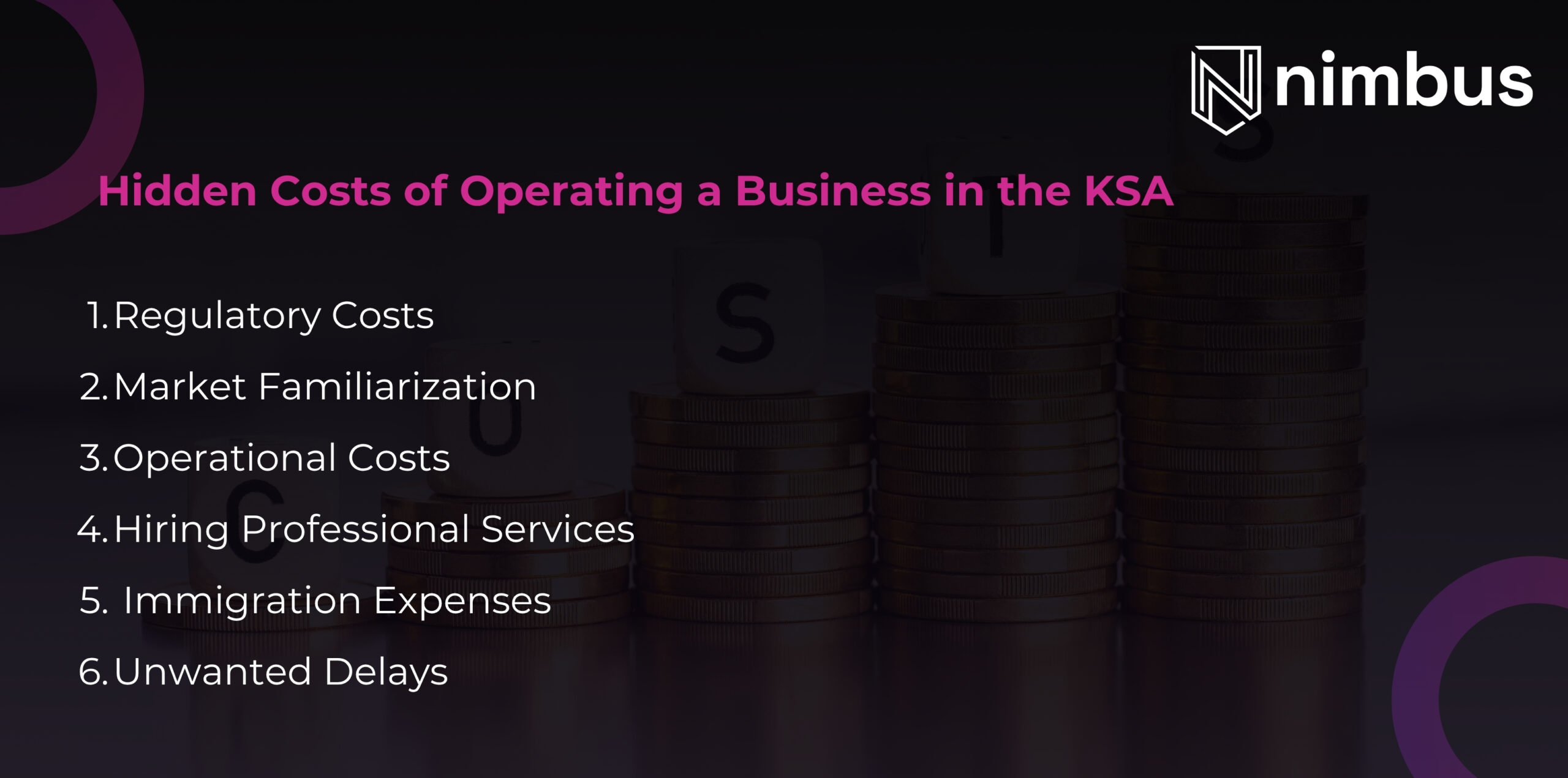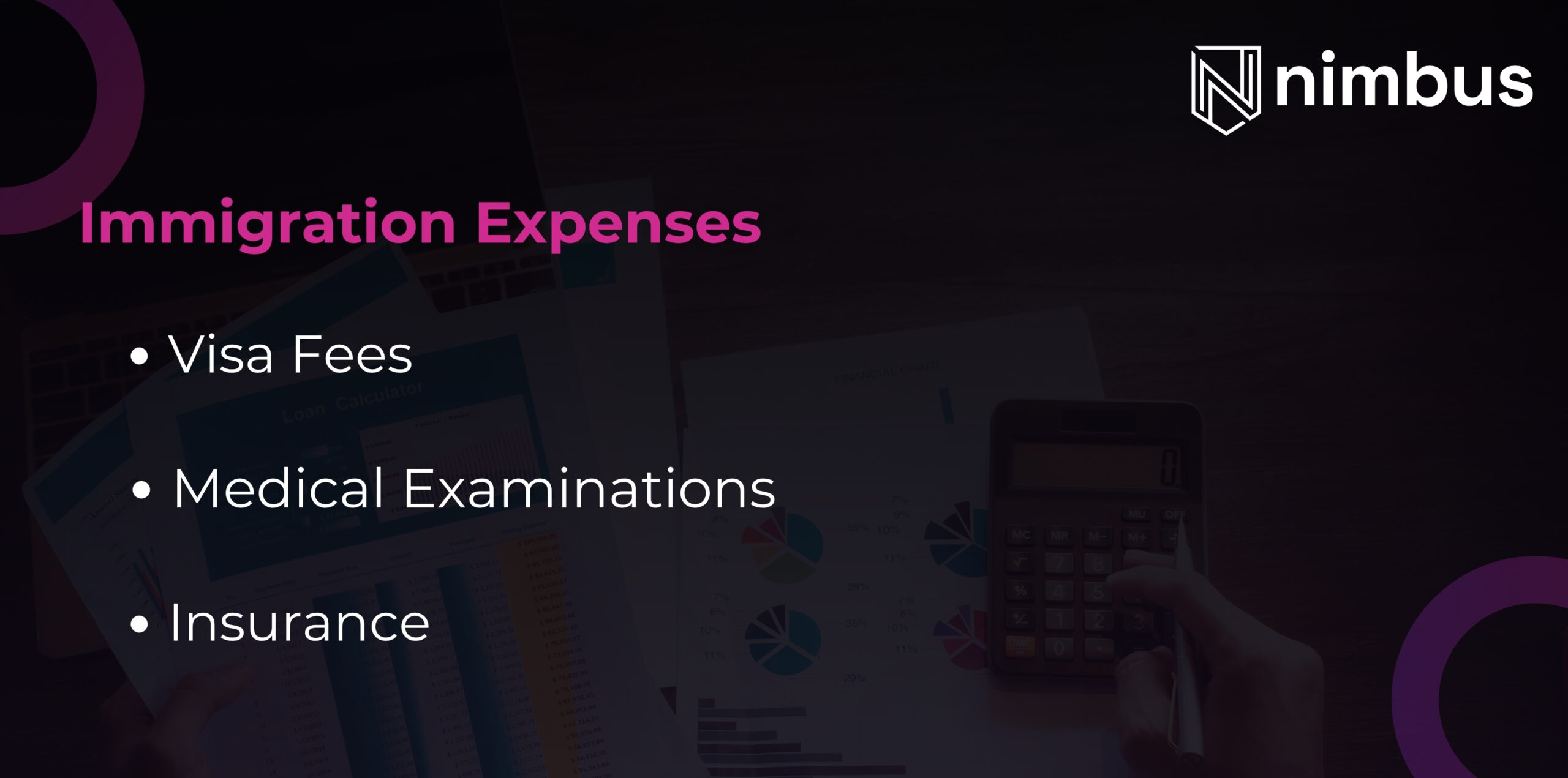Saudi Arabia is fast becoming a magnet for global investors. Thanks to its Vision 2030 strategy, the Kingdom is opening doors to economic prosperity by encouraging foreign investors to go for business setup in the KSA.
From technology to tourism, opportunities abound for businesses looking to expand. However, while the business environment appears increasingly favorable, many companies eyeing business incorporation in Saudi Arabia encounter unanticipated expenses that can derail timelines, budgets, or even their long-term viability.
In this blog, we break down the hidden costs you may face when running a business in Saudi Arabia and how to better prepare for them.
Hidden Costs of Operating a Business in the KSA

1. Regulatory Costs
Saudi Arabia has made considerable progress in improving its ease of doing business. Yet, the regulatory framework still requires a deep understanding of government protocols, paperwork, and sector-specific rules.
Common Costs:
- Business Licenses: While initial registration through platforms like Meras or MISA (Ministry of Investment Saudi Arabia) is streamlined, fees for business licensing, renewals, and amendments can quickly stack up.
- Compliance Requirements: Certain sectors have specific regulatory frameworks, including environmental approvals, health certifications, or trade-specific permits, all of which involve added fees.
- Saudization Costs: One of the most significant and mandatory considerations is Saudization (Nitaqat), a government policy requiring businesses to employ a percentage of Saudi nationals, depending on their industry and size.
Additional Cost Factors of Localization Include:
- Hiring Local Talent: While there’s a growing pool of educated professionals, recruiting the right talent for specialized roles can be expensive.
- Training & Upskilling: Many companies must invest in training programs to bring local hires up to required operational standards.
- Compliance Penalties: Non-compliance or underperformance in Saudization quotas can lead to fines, suspension of government services, or work visa limitations.
One commonly overlooked aspect is the ongoing compliance with changes in regulations, especially in industries like fintech, healthcare, and construction.
2. Market Familiarization
Understanding how business is conducted in Saudi Arabia is critical to success. This includes not just language, but cultural values, communication styles, and even the rhythm of the business week (which runs from Sunday to Thursday).
Hidden Expenses Include:
- Cultural Consulting Services: Many firms choose to hire advisors or consultants who help interpret local customs, especially during the early setup phase.
- Localized Marketing: Campaigns designed for international audiences often fall flat in Saudi Arabia unless adapted to local sensibilities. This requires changes in language, visuals, and messaging.
3. Operational Costs
Business setup in Saudi Arabia isn’t just about getting licensed. The infrastructure needed to support business operations can be more costly than expected, especially in cities like Riyadh, Jeddah, and Dammam.
Examples of Costs:
- Office Rentals: Premium commercial real estate in prime business zones can command high monthly rates.
- Utilities and Setup: Initial setup for internet, power, and water often requires deposits and connection fees.
- Import Duties & Logistics: Businesses dealing in physical goods should account for customs duties, transportation, and warehousing.
Additionally, companies entering from outside the GCC must consider shipping lead times and possible delays at customs checkpoints.
4. Hiring Professional Services
Saudi Arabia’s legal landscape is evolving to attract foreign investment, but it remains highly localized in practice. This means international firms must work closely with local legal and financial experts.
Expected Costs:
- Legal Advisory: Contract drafting, licensing compliance, and labor law interpretation require expert guidance, especially if your business is entering into partnerships or JV agreements.
- IP Protection: Registering trademarks or patents in Saudi Arabia comes with its own set of fees and documentation requirements.
- Accounting & Audit Services: Companies are expected to maintain audited financial records annually, which means engaging local accounting firms familiar with Zakat and tax obligations.
These costs are not one-time expenses as they often become part of your annual operational budget.
5. Immigration Expenses
Hiring foreign talent in Saudi Arabia involves a regulated visa system. Every expatriate employee requires an Iqama (residency permit), and the employer is responsible for arranging and sponsoring it.

Expenses Include:
- Visa Fees: Work visa applications involve multiple steps and associated charges for processing, stamping, and issuance.
- Medical Examinations: All foreign employees must undergo medical tests, both in their home country and after arriving in Saudi Arabia.
- Insurance: Health insurance coverage is mandatory for expatriates and adds to overall employment costs.
These costs can escalate when setting up a full team or transferring multiple employees to the Kingdom.
6. Unwanted Delays
Many of the above processes, like licensing, visa issuance, and recruitment, take time. These delays can push back your entry strategy or affect contractual deadlines.
Incurred Delay Costs May Include:
- Idle Overheads: Paying rent, salaries, or service retainers while waiting on approvals can drain cash flow.
- Lost Competitive Edge: Late market entry can allow competitors to capture market share.
Plan Smart: How to Minimize These Costs?
These hidden costs, however, don’t mean you shouldn’t consider expanding to Saudi Arabia. But it’s imperative to understand that awareness and proper preparation are your best defense.
Strategies to Reduce Risk:
- Engage Local Advisors: Lawyers, consultants, and PRO (public relations officers) services can offer insight and expedite paperwork.
- Start Small, Scale Gradually: Pilot your business model with a minimal viable operation before fully scaling.
- Leverage Government Resources: The Saudi government offers incentives for certain industries. So, research what’s available through MISA and other platforms.
Saudi Arabia is no longer the difficult-to-penetrate market it once was. But it’s still a place where local knowledge and smart planning matter deeply. Companies that fail to prepare for the hidden costs of doing business here often find themselves struggling.
Whether you’re setting up a branch, a joint venture, or a new entity altogether, taking time to map out the hidden financial and procedural costs will save you frustration and give your business a stronger foundation for growth.



